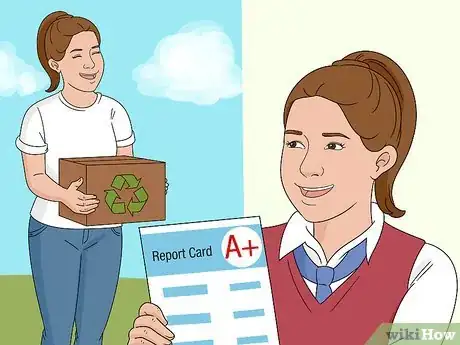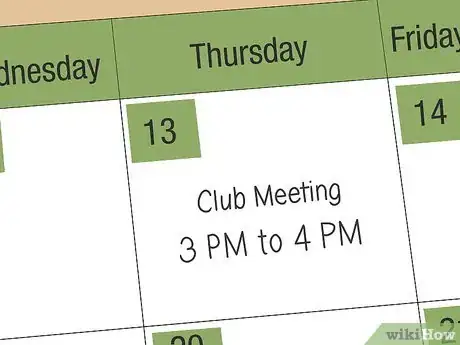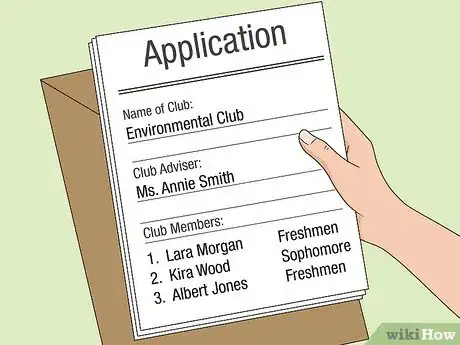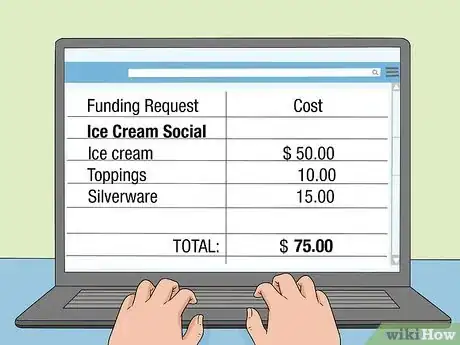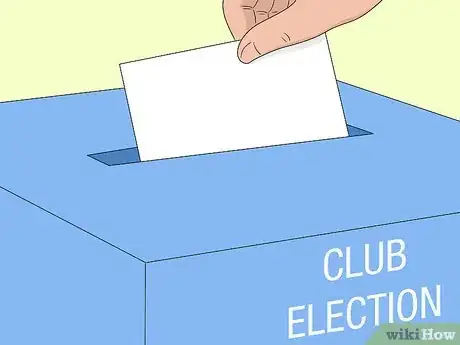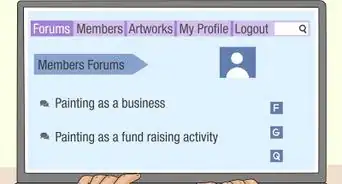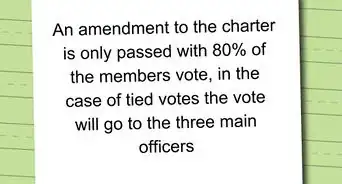This article was co-authored by Alicia Oglesby and by wikiHow staff writer, Janice Tieperman. Alicia Oglesby is a Professional School Counselor and the Director of School and College Counseling at Bishop McNamara High School outside of Washington DC. With over ten years of experience in counseling, Alicia specializes in academic advising, social-emotional skills, and career counseling. Alicia holds a BS in Psychology from Howard University and a Master’s in Clinical Counseling and Applied Psychology from Chestnut Hill College. She also studied Race and Mental Health at Virginia Tech. Alicia holds Professional School Counseling Certifications in both Washington DC and Pennsylvania. She has created a college counseling program in its entirety and developed five programs focused on application workshops, parent information workshops, essay writing collaborative, peer-reviewed application activities, and financial aid literacy events.
There are 9 references cited in this article, which can be found at the bottom of the page.
wikiHow marks an article as reader-approved once it receives enough positive feedback. In this case, 85% of readers who voted found the article helpful, earning it our reader-approved status.
This article has been viewed 235,828 times.
Would you like to spice up your daily routine? School clubs are an awesome way to focus on your interests while also providing a much-needed break from homework and studying. Even if your school doesn’t offer many different clubs, you may still be in luck. As long as you’re willing to put the work, you can start a club of your very own. Don’t worry—we’ve answered all your frequently asked questions to help you along this exciting journey.
Steps
What type of club should I start?
-
1Create a club that matches your interests. Your new club can be just about anything, as long as it doesn’t break your school’s rules. You might start a sports club, like badminton or ultimate frisbee, or an academic-themed club, like Model UN, mock trial, or chess. You could even focus on a really specific interest, like anime, gaming, or gardening.[5] Choose a topic that really speaks to you, and that other students might be interested in joining.
-
2You could also start a chapter of an established club at your school. Well-known organizations like the American Red Cross, UNICEF, Key Club, and Lion’s Club all host clubs at the school-level. Pick a club that really meshes with your interests, whether it’s community service, academics, or something else altogether.
- Here are some resources for starting a Red Cross Club: http://redcrossyouth.org/college-resources/college/how-to-start-a-red-cross-club-2/
- This guide can help you start a Key Club: https://www.keyclub.org/membership/how-to-start-a-club.
What do I need to start a new club?
-
1Ask a faculty member on board to supervise your club. Most schools will require your new club to have a faculty adviser, who can help guide the group. Chat with a teacher or staff member who you’re really friendly with, and who has some background in your club’s topic. Ask if they’d be willing to support and sponsor your club.[8]
- Plan on speaking with multiple faculty members, in case your first choice says no.
- Say something like, “Hi Mr. Williams! I was thinking about starting a newspaper club. I learned a lot from you in your English class last semester, and I was wondering if you’d like to be the club sponsor.”
-
2Plan when you’ll meet and what you’ll do. Choose a date and time that works well for you, your sponsor, and your potential members. Chances are, your club will meet at some point after school. Then, create a rough outline of what your meetings will look like, and what you’ll accomplish during that time.[9]
- For instance, you might decide to meet on Thursday afternoons from 3 PM to 4 PM.
- In a yearbook club meeting, you might discuss club announcements, suggest new ideas, and plan potential page layouts.
- Some schools might let you meet during a free period, while others might have you meet after school. Check with your school administration to see what your options are.
-
3Submit an official application. Pick up a club application form from your school administration. Many schools will ask you to include a list of potential club members, along with a copy of your club’s by-laws or constitution. You may also have to create a budget for your club. Fill out the form with your fellow club members and faculty adviser so the application is as detailed and accurate as it can possibly be.
How do I make a club budget?
-
1Outline your club’s goals first. Think about what your club is for, and what you’d like to do. Once you’ve outlined your club’s goals, brainstorm how you plan on achieving them. These suggestions and ideas will be a good starting point for your budget.[10]
- For a wiffle ball club, a goal could be: “We will get together for wiffle ball games twice a month.”
- For a political club, a goal could be: “We will buy a web domain and post blog entries about our opinions.”
-
2Draft a list of funding requests. Think about the upcoming events and meetings your club will have. Write out a general list with all these general funding requests, so you have a good starting point.[11]
- For instance, you might fill out a funding request for a museum trip. In this request, you’d ask for money for transportation, and possibly admission to the museum.
- Don’t forget about marketing! If you plan on creating fliers or other advertisements, include those in your budget.
-
3Go into detail about each funding request. Explain what you’ll need to buy for each meeting and event, and how much these items will cost. Then, add up all of the costs, so your school knows how much money the club needs each semester. Transfer this information to a spreadsheet, so it’s really easy to navigate.[12]
- For instance, if your club is holding an ice cream social, you’d need money for ice cream, toppings, and silverware.
Expert Q&A
Did you know you can get expert answers for this article?
Unlock expert answers by supporting wikiHow
-
QuestionHow should a high school club be organized?
 Alicia OglesbyAlicia Oglesby is a Professional School Counselor and the Director of School and College Counseling at Bishop McNamara High School outside of Washington DC. With over ten years of experience in counseling, Alicia specializes in academic advising, social-emotional skills, and career counseling. Alicia holds a BS in Psychology from Howard University and a Master’s in Clinical Counseling and Applied Psychology from Chestnut Hill College. She also studied Race and Mental Health at Virginia Tech. Alicia holds Professional School Counseling Certifications in both Washington DC and Pennsylvania. She has created a college counseling program in its entirety and developed five programs focused on application workshops, parent information workshops, essay writing collaborative, peer-reviewed application activities, and financial aid literacy events.
Alicia OglesbyAlicia Oglesby is a Professional School Counselor and the Director of School and College Counseling at Bishop McNamara High School outside of Washington DC. With over ten years of experience in counseling, Alicia specializes in academic advising, social-emotional skills, and career counseling. Alicia holds a BS in Psychology from Howard University and a Master’s in Clinical Counseling and Applied Psychology from Chestnut Hill College. She also studied Race and Mental Health at Virginia Tech. Alicia holds Professional School Counseling Certifications in both Washington DC and Pennsylvania. She has created a college counseling program in its entirety and developed five programs focused on application workshops, parent information workshops, essay writing collaborative, peer-reviewed application activities, and financial aid literacy events.
Professional School Counselor
-
QuestionWho should my club choose as president?
 Alicia OglesbyAlicia Oglesby is a Professional School Counselor and the Director of School and College Counseling at Bishop McNamara High School outside of Washington DC. With over ten years of experience in counseling, Alicia specializes in academic advising, social-emotional skills, and career counseling. Alicia holds a BS in Psychology from Howard University and a Master’s in Clinical Counseling and Applied Psychology from Chestnut Hill College. She also studied Race and Mental Health at Virginia Tech. Alicia holds Professional School Counseling Certifications in both Washington DC and Pennsylvania. She has created a college counseling program in its entirety and developed five programs focused on application workshops, parent information workshops, essay writing collaborative, peer-reviewed application activities, and financial aid literacy events.
Alicia OglesbyAlicia Oglesby is a Professional School Counselor and the Director of School and College Counseling at Bishop McNamara High School outside of Washington DC. With over ten years of experience in counseling, Alicia specializes in academic advising, social-emotional skills, and career counseling. Alicia holds a BS in Psychology from Howard University and a Master’s in Clinical Counseling and Applied Psychology from Chestnut Hill College. She also studied Race and Mental Health at Virginia Tech. Alicia holds Professional School Counseling Certifications in both Washington DC and Pennsylvania. She has created a college counseling program in its entirety and developed five programs focused on application workshops, parent information workshops, essay writing collaborative, peer-reviewed application activities, and financial aid literacy events.
Professional School Counselor
-
QuestionDo you need a teacher to start a school club?
 Alicia OglesbyAlicia Oglesby is a Professional School Counselor and the Director of School and College Counseling at Bishop McNamara High School outside of Washington DC. With over ten years of experience in counseling, Alicia specializes in academic advising, social-emotional skills, and career counseling. Alicia holds a BS in Psychology from Howard University and a Master’s in Clinical Counseling and Applied Psychology from Chestnut Hill College. She also studied Race and Mental Health at Virginia Tech. Alicia holds Professional School Counseling Certifications in both Washington DC and Pennsylvania. She has created a college counseling program in its entirety and developed five programs focused on application workshops, parent information workshops, essay writing collaborative, peer-reviewed application activities, and financial aid literacy events.
Alicia OglesbyAlicia Oglesby is a Professional School Counselor and the Director of School and College Counseling at Bishop McNamara High School outside of Washington DC. With over ten years of experience in counseling, Alicia specializes in academic advising, social-emotional skills, and career counseling. Alicia holds a BS in Psychology from Howard University and a Master’s in Clinical Counseling and Applied Psychology from Chestnut Hill College. She also studied Race and Mental Health at Virginia Tech. Alicia holds Professional School Counseling Certifications in both Washington DC and Pennsylvania. She has created a college counseling program in its entirety and developed five programs focused on application workshops, parent information workshops, essay writing collaborative, peer-reviewed application activities, and financial aid literacy events.
Professional School Counselor
References
- ↑ https://www.crimsoneducation.org/us/blog/extracurriculars/benefits-of-extracurricular-activities/
- ↑ https://www.kon.org/urc/v5/fujita.html
- ↑ https://www.rookiemag.com/2015/11/start-school-club/
- ↑ https://www.rookiemag.com/2015/11/start-school-club/
- ↑ https://www.lschs.org/student-life/clubs-activities/list-of-clubs-activities
- ↑ https://www.scientificamerican.com/article/how-to-start-an-environment-club/
- ↑ https://www.randomactsofkindness.org/additional-resources/How_to_Start_Your_Own_Kindness_Club.pdf
- ↑ https://www.rookiemag.com/2015/11/start-school-club/
- ↑ https://www.rookiemag.com/2015/11/start-school-club/
- ↑ https://www.liberty.edu/students/sga/wp-content/uploads/sites/93/2020/05/How-to-Budget-for-Your-Club.pdf
- ↑ https://www.liberty.edu/students/sga/wp-content/uploads/sites/93/2020/05/How-to-Budget-for-Your-Club.pdf
- ↑ https://www.liberty.edu/students/sga/wp-content/uploads/sites/93/2020/05/How-to-Budget-for-Your-Club.pdf
- ↑ https://www.rookiemag.com/2015/11/start-school-club/
- ↑ https://www.redcross.org/content/dam/redcross/atg/PDFs/Red_Cross_Club_Toolkit_-_Club_in_a_Box.pdf
- ↑ https://www.nassp.org/fees-for-student-activities/
About This Article
In order to start a school club, you’ll need to come up with a plan and decide on important details like what the club is about and where it will meet. Then, type up your plan and run it by school staff members, like the principal, to find out if there are any rules for new clubs. Once your club is approved, fill it with responsible friends who are interested in your club’s mission, and assign roles to specific members, like officers. Finally, persuade others to join by putting up a sign-up sheet for new members. For tips on how to run your club, like why staying organized will help your club succeed, read on!
